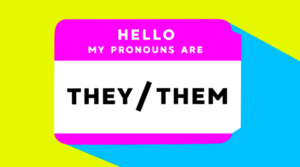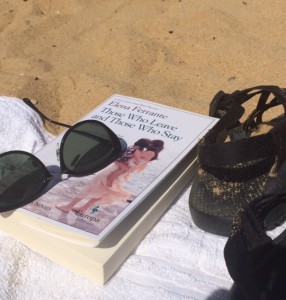Category — Language
They. Them. We. Us.

My initial reaction, now quite a while ago, to the use of they and them as singular pronouns for those who identify as both she and he—or neither–was as a grammar nerd. How could one word mean two different things? How could “they” refer to both a single human and a group of humans?
This bothered me the way the whole man/mankind argument had bothered me decades before. You know, the pushback from those who insisted that Peace on Earth, Good will to Men included all people. Because, they said, we understand “man” and “mankind” to be inclusive. Because, they said, there exists in our language something called the “generic man.” And those who don’t accept this generic thing are just playing the PC card. The generic man idea was simultaneously deeply sexist and just bad (and confusing) word use. One word cannot mean two different things: an individual male human and all humans.
An aside: To test the notion that there was understanding of the generic, inclusive “man,” researchers asked elementary school girls and boys to draw pictures to illustrate a hypothetical history book with supposedly gender-inclusive chapters titled “Colonial Man” and “Democratic Man.” All of the boys and just about all of the girls drew pictures of men only.
So, I have struggled, wondering why our language has gender-neutral plural pronouns while lacking gender-neutral singular pronouns. (Happily, at least, we don’t assign gender to inanimate objects like the Romance languages: la chaise, the feminine chair; le bureau, the masculine desk.)
I know and love that language is a living thing, which means it grows and changes. And I love that people can take control of language and use it in powerful and empowering ways. So, in every way other than grammatically, I embrace they and them as personal pronouns of choice.
Here is an alternative! Ursula LeGuinn contemplated it when she wrote The Left Hand of Darkness about a world inhabited by androgynous humans: The singular pronoun per. It stands for person. The whole person, the complete and complicated person: female, male, androgynous, non-binary, intersex, trans. Just us. The inclusive us.
How about it?
Lauren Kessler
My pronouns are per and pers
July 5, 2023 6 Comments
The voice(s) we listen to

Most nights I go to sleep listening to a mediation I choose from InsightTimer. There are thousands to choose from on this (free) app, including way too many recorded by men with Australian accents (so not restful) and way too many recorded by women with whispery voices (just annoying) and more than a handful that are over-the-top woo-woo (I do not need to visit the Astral plain, thank you very much). But there are also some lovely, thoughtful, deep-breath-inducing reflections that help create the calm space between awake and asleep. I love that space. I may love it more than sleep itself.
Many of the mediations I listen to ask you to think of a sankalpa, the Sanskrit word for intention. (San means “to become one with” and kalpa means “time” and “subconscious mind.”) And no, I didn’t know that. I looked it up. A sankalpa is a way to set intention. It puts into words—a simple declarative sentence—what you need or want or aspire to. But the “secret” is that it is expressed as, essentially, a done deal rather than a “gee, I hope…” statement. So, for example, if a certain person who will remain nameless (well, okay, not so nameless) had a rough, emotionally challenging day and is concerned that she will have trouble clearing her head and falling asleep, the sankalpa would be expressed “I will enjoy a deep and restful sleep” and not “I hope I can get to sleep tonight.”
Consider the difference between those two statements. One is optimistic and empowering. The other already sets you back on your heels and reinforces the difficulties you are imagining.
I have been sankalpa-ing for a while now, but just this morning I put together this practice with what I’ve learned about the “saboteurs”—that cacophony of inner critics who are determined to tell us what we can’t do, what we shouldn’t do, or what we should do that we shouldn’t do. Having a sankalpa allows you to catch those negative thoughts, then work on replacing them with this positive statement.
Believe it not, the sankalpa talks louder than the saboteur.
March 29, 2023 No Comments
The people I love the best

This. This. This.
This poem by Marge Piercy.
This poem about the hard sweaty work that needs to be done–and those who harness themselves, like an ox to a heavy cart, and do it.
The people I love the best
jump into work head first
without dallying in the shallows
and swim off with sure strokes almost out of sight.
They seem to become natives of that element,
the black sleek heads of seals
bouncing like half-submerged balls.
I love people who harness themselves, an ox to a heavy cart,
who pull like water buffalo, with massive patience,
who strain in the mud and the muck to move things forward,
who do what has to be done, again and again.
I want to be with people who submerge
in the task, who go into the fields to harvest
and work in a row and pass the bags along,
who are not parlor generals and field deserters
but move in a common rhythm
when the food must come in or the fire be put out.
The work of the world is common as mud.
Botched, it smears the hands, crumbles to dust.
But the thing worth doing well done
has a shape that satisfies, clean and evident.
Greek amphoras for wine or oil,
Hopi vases that held corn, are put in museums
but you know they were made to be used.
The pitcher cries for water to carry
and a person for work that is real.
“Marge Piercy is not just an author, she’s a cultural touchstone. Few writers in modern memory have sustained her passion, and skill…” — THE BOSTON GLOBE
Image: Vincent Van Gogh, Red Vineyard at Arles (1888)
September 2, 2020 2 Comments
Paint. Write. See.


My mother and my grandfather were both painters, she in oil, he in watercolor. I grew up surrounded by their art. I watched my mother at her easel. (I was once her unhappy model.) But until a few days ago, standing in front of a painting at the Stradt der Frauen exhibit, I never thought about a particular similarity between the work of a painter and the work of a writer.
I don’t mean the obvious similarities: the canvas/ the page; the paint/ the words. I mean something about the way the work is done, the purposeful nearsightedness and farsightedness of the work.
Let me explain. I was walking through one of the rooms in the exhibit and found myself skirting a small group of people clustered around a painting, The Dreamers, by Helene Funke. She was one of the more than dozen forgotten or overlooked women painters of the early 20th century being rediscovered and celebrated in this exhibition.
Historical aside: “Forgotten” and “rediscovered” are loaded words here. She was actually quite well known in French circles before the first World War and established a reputation in Vienna, despite hostile criticism coming from the male-dominated cultural scene. After the 1938 Anschluss (the German/Nazi take-over of Austria), modern art was banished and her work, as well as the work of many others, disappeared. It was not until 2007 that she was rediscovered.
Okay, back to the lower Belvedere and the exhibit. In skirting the group, I found myself just inches away from the canvas. This is not how I look at art. From a nose away, it is all brush stroke and palette knife, thickness and featheriness, color laid on color. It is not art. It is craft. It is the work itself. The detail. You see how the sausage was made. You have to stand back to see the sausage itself.
How like writing, I thought. The nose-away detail of word choice and punctuation, the specific construction of the sentence, where the paragraph breaks. The writer works with her tools, up close, just as the painter does. Then, from a distance, the reader encounters the work and sees the art.
Okay, enough of the High Culture stuff. It’s time to walk to the Spar and hunt for some Spargelcremesuppe. You’d have to have read last week’s blog for that to make sense.
April 3, 2019 2 Comments
Humility
I am the least racist person you will ever meet.
This was the largest audience to ever witness an inauguration, period.
I have assembled the best cabinet in the history of the world.
People have given me credit for having great chemistry with all of the leaders.
Never has there been a president….with few exceptions…who’s passed more legislation, who’s done more things than I have.
Ah, the fine art of humility as practiced by the Leader of the Free World.
Let us, please, not become numb to the vanity, the hubris, the narcissism, the self-aggrandizement, the heart-stopping lack of perspective – the amorality – of all this because we hear it everyday, because it has become part of the political canon, the cultural canon. Because egomaniacal statements like this are the stuff of funny memes and clever Facebook posts and witty Shouts & Murmurs columns. We laugh. Okay, laugh. But do not forget: This is not normal. This is not good. This, in fact, erodes the soul.
You know what feeds the soul? Humility.
Humility is not self-doubt or self-deprecation. It is not meekness. You do not give up “pride” in yourself when you are humble. You give up being prideful. “Humility is not thinking less of yourself, but thinking of yourself less.” (The quote is attributed to, among others, Christian philosopher C.S. Lewis and Islamic theologian Waleed Basyouni. Point taken.)
Humility is a recognition of who you are and your place is the world. (Carl Sagan famously said, “We are like butterflies who flutter for a day and think it’s forever.”) Or, should you want to be even more humble, your place in the universe. (as in “tiny speck”). It’s worth considering that the term “humility” comes from the Latin word humilitas, a noun related to the adjective humilis, which may be translated as “humble” but also as “grounded” or “from the earth,” as in humus (earth).
And so, drowning in this sea of bloated, inflated, self-serving rhetoric, let us swim toward land. Let us plant our feet, stay grounded, from the earth, humble.
(Well, okay, Ali WAS the greatest.)
August 9, 2017 1 Comment
Bunk, balderdash, malarkey
 Lest you think this post is akin to Nero fiddling while Rome burned (which he didn’t, by the way: The fiddle wasn’t invented yet.), I will say pro-actively and in my own defense that I DO, in fact, think and care about MUCH MORE IMPORTANT things than the subject of this post. But, frankly, I am all Comey-ed, Trump-ed and Session-ed out. Oh, that’s yesterday. Today there’s a horrific fire, yet another crazed shooter. These neural pathways need a momentary rest. And so I am allowing myself to feel righteous indignation about something else. Something small. Like these stupid sayings. I am calling bullshit on these sayings.
Lest you think this post is akin to Nero fiddling while Rome burned (which he didn’t, by the way: The fiddle wasn’t invented yet.), I will say pro-actively and in my own defense that I DO, in fact, think and care about MUCH MORE IMPORTANT things than the subject of this post. But, frankly, I am all Comey-ed, Trump-ed and Session-ed out. Oh, that’s yesterday. Today there’s a horrific fire, yet another crazed shooter. These neural pathways need a momentary rest. And so I am allowing myself to feel righteous indignation about something else. Something small. Like these stupid sayings. I am calling bullshit on these sayings.
“That’s like comparing apples to oranges” – meaning you can’t compare the two because they are so different. What? They are both fruit. They both grow on trees. They are spherical. They are both in the top five most-consumed fruits in America. Why the hell can’t you compare them? Apples are better than oranges. See. I just compared them.
“Everything in moderation.” Seriously? Like love your children in moderation? Like be moderately creative? Moderately empathetic? Moderately generous? I. Don’t. Think. So. Be excessively loving. Burn with creativity. Open all the gates to empathy. Be generous to a fault. Because it’s not a fault.
“One picture is worth a thousand words.” Speaking as both a writer and a photographer, let me say: Bullshit. Still images can have enormous power and emotional resonance. It is possible to read subtext into an image. But not 1000 words of subtext. Or text. Words also have power and resonance. Aside from communicating emotion, which images do quite well, words can communicate what happens or happened outside the frame: backstory, context, inner and outer motivation, relationships, nuance. In fact, my friends, one word might be worth a thousand pictures. Love. Trust. Respect.
“Don’t sweat the small stuff.” First of all, in the scope of things in this world, in the universe, in the ether of time, it’s all small stuff: your divorce, your kid’s shitty report card, the 45th president. Small stuff. Second, of course sweat the small stuff. From a writer’s point of view, it’s all about sweating the small stuff: laboring to find the single right word, cogitating over the use of a comma, spending an hour crafting a single sentence that sings. It is the culmination of sweating all the small stuff that leads to the good, big stuff. Now if I could only find the single right word for stuff.
“Live every day as if it were your last.” Okay, I don’t know how YOU would live your final 24 hours on earth, but here’s what I’d do: Plan A: All-day hike among the early summer wildflowers in Kootenay National Park, British Columbia, fueled by multiple generous handfuls of high-quality gorp. Plan B (should I be physically incapacitated on my last day): Binge watch every Thin Man movie while eating chocolate éclairs (maybe a cannoli or two thrown in) and having my feet rosemary-oil massaged. So, really, I can’t live every day as if it were my last, can I?
Your turn.
June 14, 2017 2 Comments
Liar, Liar, President on Fire
 What we are seeing, what we are in the throes of, my fellow Americans, is part Huxley, part Orwell – and a whole lot of Leon Festinger.
What we are seeing, what we are in the throes of, my fellow Americans, is part Huxley, part Orwell – and a whole lot of Leon Festinger.
OK. So Huxley is obvious. As in Brave New World, we are seeing the construction and manipulation of a “state” based on the principles of obedience, homogeneity and consumption. Indoctrination is not via hypnosis but rather tweet blasts and bald-faced lies masquerading as “alternative facts.”
And then there’s Orwell, literary creator of a dystopia controlled by privileged few and headed by a leader who enjoys an intense cult of personality. (Um…?) Remember newspeak and doublethink? War is Peace. Ignorance is Strength. Black is White. A true believer not only proclaims black is white, but believes black is white and forgets that anyone ever believed the contrary.
But who the heck is Leon Festinger?
Leon Festinger was an American social psychologist best known for developing the theory of cognitive dissonance. Cognitive dissonance occurs when you are faced with reality that goes against what you firmly believe. For example, you firmly believe – you have been led to believe (you voted based on the belief) – that the Affordable Care Act is “imploding,” and that Trump’s plan will, as promised, insure more people, giving them more choice, at a lower cost.
Then you are faced with the reality of that Plan: that millions of people will lose their coverage or not be able to afford coverage (so choice is not an issue) and that the cost for those who most need insurance – hint: not the young and healthy – will increase (and I use this word advisedly) astronomically. And that you, working-class, rural, Red state supporter, are in the crosshairs.
What do you, true believer, do with that information?
Leon figured that one out back in 1956 – it’s known as “belief disconfirmation” — when he and colleagues wrote When Prophecy Fails. Here’s what happens: In the face of patently contradictory, inarguable verifiable information, your original belief is…deepened. Or, slightly reconfigured to make room for the clearly contradictory information without that new information materially changing your original belief.
You may have heard about the famous study that underlies this finding. It had to do with an apocalyptic religious cult, members of which had given up homes, jobs, material possessions — and left their families – in preparation for the end of the world. The world was ending because of Sodom-and-Gomorrah type corruption (like, oh, being able to use the bathroom of the gender you identify with). Only the self-sanctified members of this cult would survive, spirited to the planet Clarion by an alien spaceship. No, this is not the plot of a 1950s sci-fi pot-boiler.
The world would end (big flood) right before dawn on Dec. 21, 1954. The rescue spaceship would arrive at a predetermined place on the stroke of midnight.
The cult assembled. Midnight stroked. No spaceship. The disconfirmed prophecy caused them acute cognitive-dissonance: Had they been victims of a hoax? Had they foolishly given up everything? What Festinger found was that to resolve the dissonance between apocalyptic, end-of-the-world beliefs (oh, let’s just call them Trumpisms) and the earthly reality (oh, let’s just call it reality), most of the cult restored their psychological consonance by choosing to hold a less mentally-stressful idea to explain the missed landing. Instead, they decided to believe the alternate facts their leader presented: The aliens hadn’t arrived not because the prophesy was false but because the aliens had given planet Earth a second chance. In the face of the prophesy-that-didn’t-happen, people did not leave the cult. People did not stop believing in the corruption of the world and their own sanctified status. In fact, they got out and proselytized.
As Festinger wrote, “If more and more people can be persuaded that the system of belief is correct, then clearly it must after all be correct.”
March 15, 2017 4 Comments
Take back civility
 Life’s a bitch. Don’t vote for one.
Life’s a bitch. Don’t vote for one.
She’s a cunt. Vote for Trump.
Better to grab a pussy than be one.
Don’t be a pussy. Vote for Trump.
I wish Hillary had married OJ.
Where did all this foul, despicable, inexcusably vile rhetoric come from? How did we devolve to such base, crude, violent, sexist sloganing? Putting aside, for just a moment, ideology and political passions, forgetting (ha) gender and class and race, why should any of us engage in such degraded, loathsome speech?
Some of us would like to think these slogans (all seen on t-shirts and placards at Trump rallies) are “just” the product of the angry fringe, snarlings emerging from deep within the basket of deplorables. But you know what? Incivility has become a part of everyday American life –not just tolerated but accepted, normalized, embraced. Lashing out with name-calling, turning disagreement into rudeness, crudeness and bullying…Mr. Trump did not invent this.
I blame us – all of us – for the debasement of dialog, for our inability to argue a point without an “oh yeah, well you suck” comeback, for the failure of imagination and intelligence (not to mention garden-variety decency) that leads us to criticize a person by invoking a body part or by suggesting murder.
Anyone who’s ever scrolled through the comments section of a news site has seen (for years now) this deplorable behavior, this resorting to insult instead of engaging in debate, this crude name-calling. One study that analyzed more than 6,400 reader comments posted to the website of the Arizona Daily Star, the major daily newspaper in Tucson, found that more than 1 in 5 comments included some form of incivility, with name-calling as the most prevalent type.
More than 4 years ago — back when Mr. Trump was merely a billionaire developer reality TV host and not a candidate for the highest office in the most powerful country on the planet – Psychology Today ran a long story about the rise of incivility in American culture, pointing to – that’s right — reality TV.
We became inured to it long before Mr. Trump stirred the pot. We watched (and laughed at) the crude idiocy of Beavis and Butthead. We tuned in to bullying chefs and insulting, hot-headed talk show hosts and back-stabbing/ trash-talking “Housewives of…” It was entertainment. Just as we at first thought Mr. Trump was entertainment.
We were wrong.
And now, as we watch Mr. Trump lose, we need to pull ourselves out of the mire. We need to take responsibility and reclaim civility in American life.
We are capable of intelligent conversation. We are capable of passionate, informed and respectful debate and disagreement. And if you don’t think I’m right, then fuck off.
October 19, 2016 3 Comments
The REAL Elena Ferrante
 To write, to write with purpose, to write better than I had already. And to study the stories of the past and the present to understand how they worked, and to learn, to learn everything about the world with the sole purpose of constructing living hearts, which no one could ever do better than me…
To write, to write with purpose, to write better than I had already. And to study the stories of the past and the present to understand how they worked, and to learn, to learn everything about the world with the sole purpose of constructing living hearts, which no one could ever do better than me…
These are the thoughts of Elena Greco, the narrator of Elena Ferrante’s stunning four-book series of Neapolitan novels. But this is also the author herself, proclaiming her purpose. It is every author proclaiming her purpose, setting her intentions.
And that’s why, as I read the novels, I was content not knowing who “Elena Ferrante” really was. I knew who she was. She was a woman writing. She was a woman giving voice not just to her narrator but to every woman who is bold and then doubts herself, who works for success and then questions whether she deserves it, who is wary because that’s what a woman has to be in this world, who pretends and knows she pretends and beats herself up for pretending and then pretends again. A woman whose interior monolog is richer and deeper and darker than anyone can imagine.
The author, despite extraordinary international acclaim, chose privacy. She chose to remain cloaked in a pseudonym, and I loved that. I loved it because it allowed me to feel the work, to be fully immersed in the work. I loved it because, at a time when every author (myself included) lusts for media attention and shouts me me me on any and all social media channels, this author was letting the work speak for itself. This author put the characters first. And the setting. And the force of culture and history.
And then…the revelation.
An Italian investigative reporter, who apparently had nothing more pressing to do (may I suggest, for starters, investigating the stranglehold the Camorra has on Naples? Italy’s astonishing unemployment rate?) took it upon himself to paw through financial records and real estate records and unmask the “real” Elena Ferrante.
Asked why he would want to delve into the identity of Ms. Ferrante, whose readers value her anonymity, the journalist, Claudio Gatti said he was just doing his job.
Right.
If his job is making a name for himself. If his job is (temporarily) one-upping the most widely read, most respected FEMALE novelist of our time. He is like so many of the male characters in Ferrante’s novels – loud voice, small mind, clueless about and simultaneously jealous of the power of a woman.
He wants to steal Elena Ferrante from us. But we know who she is, and we won’t let him.
October 5, 2016 2 Comments
not-so Truisms
 I’ve been thinking about our dependence on tried-and-truisms that are actually, if we stop to think about them, just bad advice wrapped in clichés.
I’ve been thinking about our dependence on tried-and-truisms that are actually, if we stop to think about them, just bad advice wrapped in clichés.
Here’s a few I question – and soundly reject:
Take baby steps.
Absolutely not! Be audacious. Take big bold steps. Lengthen your stride, especially when you’re feeling the most timid. One giant step really can lead to another giant step.
Play to your strengths.
Really? Why would you want to do that? You already know how to do that. You’re already good at that. Why not play to your weaknesses? Why not explore those underdeveloped parts, open some doors you’ve never opened?
If it ain’t broke, don’t fix it.
Seriously? You mean don’t dream up cool new things just because the old things are working okay? Don’t tinker and fiddle? So, speaking as a writer, does this mean if the prose is serviceable, don’t mess with it. I. Don’t. Think. So.
Write what you know.
If this is meant as a warning to not write from a position of ignorance, then sure. If this is an invitation to write about only what you’ve personally experienced and understand at the moment, I reject it! Writing about what you don’t already know means you have to go learn about it, research it, think about it, stretch yourself to understand what you don’t already understand. So write what you don’t know. Think and write yourself into a place of knowing.
This next one is not bad advice, just a cliché I hate so much that I’m going to grab this opportunity to rant about it:
That’s like comparing apples to oranges.
This is supposed to mean that the two things being compared are so different that a comparison is ridiculous. Actually, the saying is ridiculous. It’s pretty easy to compare apples and oranges. Fruit. That grows on trees. Spherical. Little seeds you spit out. Makes good juice. Lunchbox favorites.
The idiom is not unique, but other languages are more inventive in their “don’t compare” comparisons. My favorite is the Serbian expression: “That’s like comparing grandmothers to toads.”
In case you’re interested (and even if you’re not), this metaphor for dissimilarity began as “apples and oysters,” first published in 1670 in a collection of proverbs.
So there.
I invite you to write in with your truisms that aren’t.
July 6, 2016 No Comments






